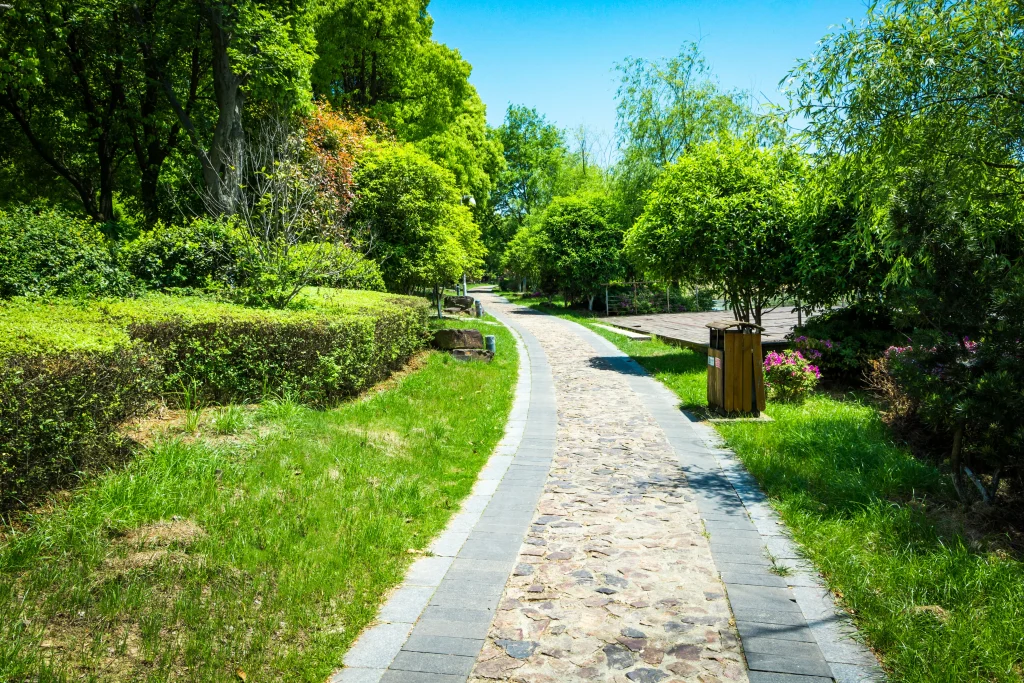How much does it cost to replace a retaining wall? Replacing a retaining wall typically costs between $40 and $300 per square foot in Denver, including demolition of the old wall and construction of the new one. Removing the old wall alone can cost $10 to $20 per square foot.
These prices reflect the comprehensive nature of retaining wall replacement – a crucial investment for Denver properties with sloped terrain.
Denver’s unique landscape creates specific challenges for property owners. The region’s hills, slopes, and varied elevations make retaining walls essential for preventing erosion, managing water runoff, and creating usable outdoor space. Over time, these walls face pressure from soil, moisture, and temperature fluctuations that can lead to damage requiring replacement.
This guide offers transparent pricing information, explains the factors affecting costs, and provides practical strategies to manage your retaining wall replacement budget effectively.
How Much Does It Cost to Replace a Retaining Wall?
Denver homeowners can expect these price ranges based on material choice:
- Concrete Block Walls cost $50-$120 per square foot installed. These walls offer excellent durability and moderate aesthetics. A standard 20-foot long, 4-foot high concrete block wall typically costs $5,000-$10,000 for complete replacement.
- Natural Stone Walls range from $150-$300 per square foot. While more expensive, these walls provide superior aesthetics and extremely long lifespans. The same 20-foot wall in natural stone would cost $12,000-$25,000.
- Timber Retaining Walls run $40-$75 per square foot installed. These walls offer the lowest upfront cost but require replacement sooner than masonry options.
- Boulder Walls cost $100-$200 per square foot and create a natural appearance perfect for Denver’s mountain aesthetic.
Labor represents 45-60% of total project costs in the Denver market. Professional installation ensures proper base preparation, drainage installation, and structural integrity – essential factors for wall longevity in Colorado’s freeze-thaw climate.
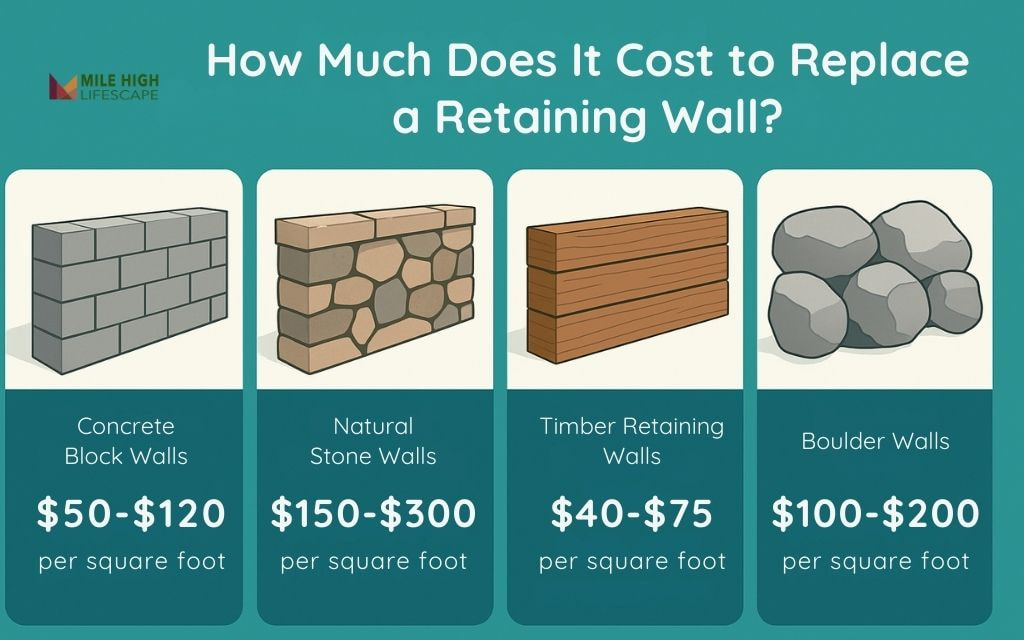
What Affects the Cost of Replacing a Retaining Wall in Denver?
Material Selection
The materials you choose for your retaining wall create the most significant price difference:
Concrete Block Walls ($50-$120/sq ft): These factory-produced blocks offer consistent quality and relatively simple installation. Options include:
- Standard CMU (gray blocks): Most affordable at $50-$75/sq ft installed
- Decorative blocks (textured/colored): Mid-range at $75-$100/sq ft installed
- Premium architectural blocks: Higher-end at $100-$120/sq ft installed
Natural Stone Walls ($150-$300/sq ft): These walls use quarried stone in various forms:
- Boulder walls: Large natural stones stacked or placed with machinery
- Cut stone: Precisely shaped blocks with tight fitting joints
- Ledgestone or flagstone: Thinner, layered stone requiring more skilled labor
Timber Walls ($40-$75/sq ft): Using pressure-treated lumber or railroad ties:
- Pressure-treated pine: Most affordable but 15-20 year lifespan
- Cedar: Moderate cost with better appearance
- Hardwoods: Higher cost with longer durability
Wall Dimensions and Complexity
Size matters significantly when calculating your retaining wall costs:
Height Considerations:
- Walls under 3 feet: Basic construction without engineering requirements
- Walls 3-4 feet: Require more substantial footings and base preparation
- Walls over 4 feet: Need professional engineering, permits, and enhanced structural support
Length Impact:
- Longer walls benefit from economies of scale with slightly lower per-foot costs
- Short walls (under 20 feet) have higher per-foot costs due to fixed setup expenses
Design Complexity:
- Straight walls cost 15-25% less than curved designs
- Corners and angles add labor time and material waste
- Tiered walls require additional excavation and drainage systems
Each additional foot of height increases pressure on the wall exponentially, requiring stronger construction methods.
Site Conditions and Accessibility
Your property’s characteristics significantly impact installation difficulty:
Slope Factors:
- Gentle slopes (under 20°): Standard installation methods
- Moderate slopes (20-30°): Require additional excavation and soil stabilization
- Steep slopes (over 30°): Need specialized equipment and installation techniques
Soil Composition:
- Sandy soil: Easier to excavate but requires more substantial drainage
- Clay soil: More difficult to work with and needs careful water management
- Rocky soil: Increases excavation costs and may require specialized equipment
Site Access:
- Drive-up access: Allows efficient material delivery and equipment use
- Limited access: Requires materials to be transported manually or with smaller equipment
- Restricted access: May need cranes or conveyors, significantly increasing costs
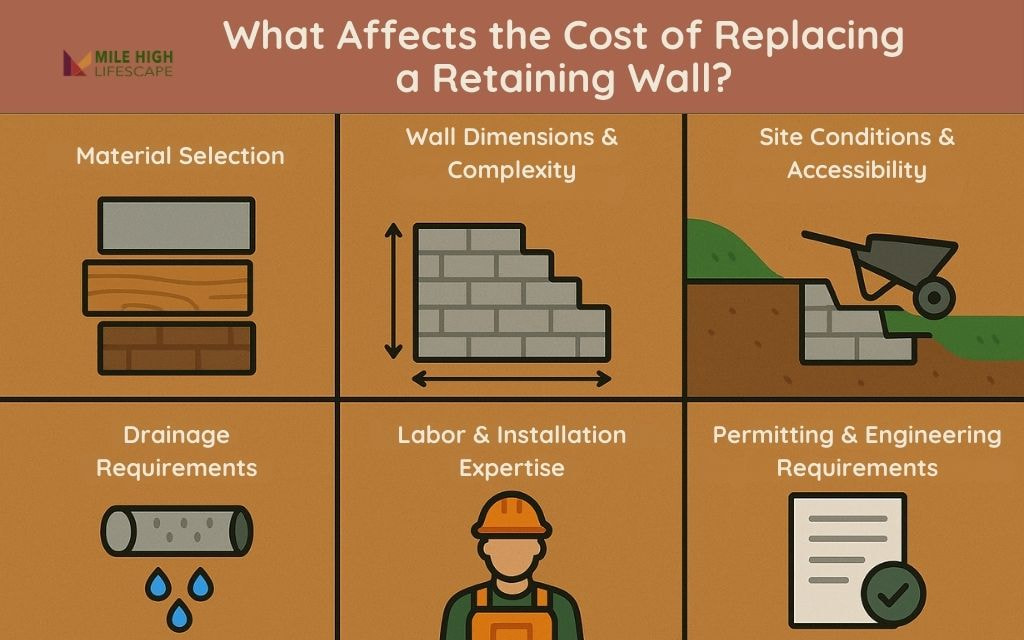
Drainage Requirements
Water management represents one of the most critical aspects of retaining wall durability:
Basic Drainage Systems ($10-$15 per linear foot):
- Gravel backfill: Creates a drainage zone behind the wall
- Filter fabric: Prevents soil from clogging the drainage system
- Weep holes: Allow water to escape through the face of the wall
Enhanced Drainage Solutions ($15-$25 per linear foot):
- Perforated pipe systems: Channel water away from the wall foundation
- French drains: Collect and redirect groundwater
- Surface water management: Includes swales or catch basins
Water Management Considerations:
- Areas with high water tables need more extensive drainage
- Properties with existing water issues require comprehensive solutions
- Hillside installations often need multiple drainage methods
Labor and Installation Expertise
Professional installation knowledge ensures wall performance and longevity:
Skill Level Requirements:
- Basic walls: General landscape contractors at $45-$60/hour
- Complex installations: Specialized retaining wall contractors at $60-$80/hour
- Engineered systems: Contractors with structural experience at $70-$90/hour
Labor Hours:
- Small walls (under 50 sq ft): 12-25 labor hours
- Medium walls (50-150 sq ft): 25-50 labor hours
- Large walls (over 150 sq ft): 50+ labor hours
Seasonal Factors:
- Peak season (spring/summer): Higher rates due to demand
- Off-season (late fall/winter): Potential discounts for non-emergency projects
- Weather delays: Can extend project timelines and affect costs
Permitting and Engineering Requirements
Denver’s building codes create specific requirements for retaining walls:
Permit Requirements:
- Walls under 4 feet: Generally exempt from permits (but check local regulations)
- Walls over 4 feet: Require building permits ($250-$500)
- Walls supporting structures: Need additional structural review
Engineering Costs:
- Basic engineering plans: $500-$1,000 for straightforward walls
- Complex engineering: $1,000-$2,500 for challenging sites or specialty designs
- Soil testing: May add $300-$800 for sites with questionable soil stability
Inspection Considerations:
- Multiple inspections may be required during construction
- Failed inspections require corrections and re-inspection
- Permit timelines affect project scheduling
Cost of Retaining Wall Repairs vs. Replacement
Before committing to a full replacement, consider whether repairs might suffice. Repair costs vary based on damage severity:
- Minor Repairs for small cracks or slight leaning typically cost $500-$2,500 in Denver. These repairs address cosmetic issues and early structural problems.
- Moderate Repairs for partial displacement or drainage problems range from $2,500-$6,000. These repairs involve partial reconstruction and drainage improvements.
- Major Repairs for significant structural failure or collapse cost $6,000-$12,000 – approaching replacement costs. When repair estimates exceed 70% of replacement costs, full replacement often provides better long-term value.
Repair becomes economically viable when the wall’s foundation remains sound and problems affect less than 25% of the wall surface. For walls older than 15 years or with widespread damage, replacement typically offers better return on investment.
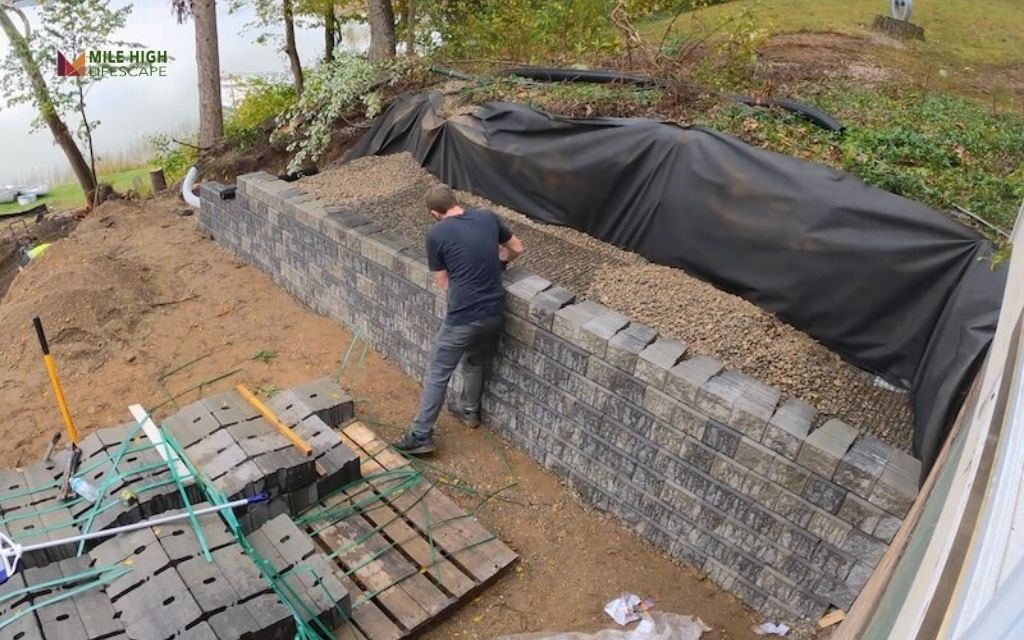
Additional Cost Factors for Retaining Wall Replacement
Beyond the basic wall construction, these factors affect your total project price:
- Excavation Costs average $1,000-$3,000 for typical Denver residential projects. Rocky soil, limited access, or extensive root systems increase these costs.
- Drainage Systems add $15-$25 per linear foot but prevent future failure. Denver’s precipitation patterns make proper drainage essential for wall longevity.
- Material Disposal costs $500-$2,000 depending on wall size and material. Concrete disposal costs more than timber due to weight and recycling requirements.
- Site Preparation including grading and soil stabilization adds $5-$10 per square foot. This preparation creates the foundation for wall stability.
- Landscaping Restoration after wall completion adds $500-$2,000 to restore vegetation and aesthetics around the new structure.
How to Save on Denver Retaining Wall Replacement Costs
Manage your project budget with these practical strategies:
- Obtain Multiple Quotes from at least three Denver contractors. Compare scope details carefully – not just bottom-line prices. Ensure quotes include all necessary components including drainage and backfill.
- Consider Material Alternatives like concrete blocks instead of natural stone for significant savings. Modern concrete products offer improved aesthetics while maintaining cost advantages.
- Schedule During Off-Peak Seasons (late fall or winter) when Denver landscaping contractors offer competitive pricing during slower periods.
- Handle Site Preparation yourself if you have the equipment and skills. Clearing vegetation, removing small obstacles, and basic excavation can reduce labor costs.
- Maintain Simplicity in wall design. Straight walls cost less than curved ones, and standard materials cost less than specialty products.
- Phase Large Projects by replacing the most critical sections first and addressing less damaged areas in future budget cycles.
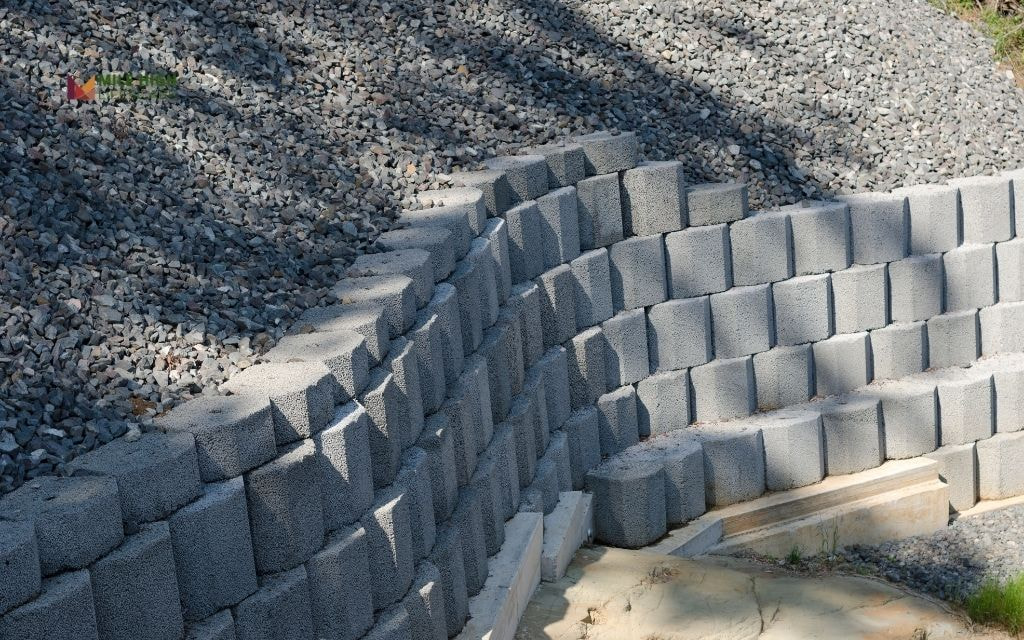
Labor and Installation Costs for Retaining Walls in Denver
Professional installation represents roughly half your project budget but ensures quality results:
- Standard Labor Rates for retaining wall installation in Denver range from $45-$80 per hour depending on contractor expertise and project complexity.
- Equipment Costs add $500-$1,500 for typical residential projects. Larger walls or difficult access points require specialized machinery at higher rates.
- Expert Installation includes proper base preparation, compaction, drainage installation, and structural alignment – critical factors for wall performance.
- Warranty Protection comes with professional installation, typically covering structural issues for 1-5 years depending on the contractor.
Denver’s freeze-thaw cycles make professional installation particularly important. Proper techniques prevent frost heave damage and ensure wall stability through seasonal changes.
DIY vs. Professional Retaining Wall Replacement
Consider these factors when deciding between DIY and professional installation:
DIY Advantages:
- Lower material-only costs (saving 40-50% on labor)
- Project timeline flexibility
- Personal satisfaction from completing the project
DIY Disadvantages:
- Limited to walls under 4 feet (permit restrictions)
- Risk of improper installation leading to premature failure
- Physical demands of heavy material handling
- No installation warranty protection
Professional Advantages:
- Expertise in proper construction techniques
- Access to specialized equipment
- Knowledge of local building codes
- Warranty protection
- Faster completion timeframes
Professional Disadvantages:
- Higher overall project cost
- Scheduling constraints based on contractor availability
For walls over 3 feet tall or those retaining significant soil pressure, professional installation provides superior long-term value despite higher initial costs.
Conclusion
Replacing a retaining wall represents a significant investment in your property’s stability and appearance. The right approach depends on your specific circumstances:
- Wall Height and Function: Taller walls or those supporting structures require professional installation.
- Budget Constraints: Balance immediate costs against long-term performance needs.
- Property Value: Higher-value Denver properties warrant premium materials and professional installation.
- Timeline Considerations: Professional installation completes projects faster but requires scheduling.
Factors unique to Denver include the region’s freeze-thaw cycles, occasional intense rainfall, and varied soil conditions. These elements make proper drainage and installation techniques particularly important for wall longevity.
Frequently Asked Questions (FAQs)
How do I estimate my retaining wall cost?
To calculate a retaining wall’s square footage, multiply its length (in feet) by its height (in feet). For a preliminary estimate, multiply this square footage by $30-$70 depending on your preferred materials. Add 15-20% for contingencies.
Are retaining walls expensive to repair?
Minor repairs typically cost $500-$2,500, while major structural repairs can reach $6,000-$12,000. When repair estimates exceed 70% of replacement costs, complete replacement often provides better value.
What is the cheapest type of retaining wall?
Concrete block (CMU) walls offer the lowest cost among permanent options, averaging $50-$120 per square foot installed. Timber walls cost less initially but require more frequent replacement.
What is the lifespan of a retaining wall?
Properly constructed retaining walls last 25-100 years depending on materials. Concrete walls typically last 30-50 years, stone walls 50-100 years, and timber walls 15-25 years in Denver’s climate.
Are retaining walls covered by insurance?
Standard homeowner’s insurance typically covers retaining walls only if damaged by specific covered events like vehicle impacts. Gradual deterioration, poor construction, or earth movement damage usually falls outside coverage. Check your specific policy details.
